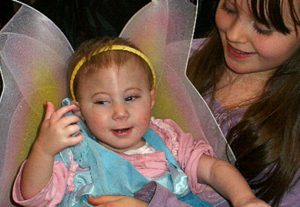
By Susan Gately - 17 July, 2016

Kathleen Rose Harkin, daughter of Tracy Harkin
The mother of a child with a life limiting condition has appealed for a public switch in attention from abortion to proper perinatal care. Tracy Harking from Every Life Counts, writing in the Irish Times on Thursday, noted how the focus of the recent “stormy abortion debate” was on why abortion should be legalised when the baby has a life-limiting condition, but “almost no mention at all of abortion alternatives.”
“Because of the way the debate has been framed, one would be forgiven for thinking there is no alternative,” she writes. “Most people in Ireland have probably never heard of perinatal hospice care, much as most don’t really know what is meant by “fatal, foetal abnormality”.
Ms Harkin, whose daughter Kathleen Rose is living with Trisomy 13, often described in this way, wrote that perinatal hospice – or perinatal palliative care – is a “model of compassionate care that begins at diagnosis”.
As author Amy Kuebelbeck explains, perinatal hospice is not a place it is more a frame of mind, and is a beautiful and practical response to one of the most heart-breaking challenges a parent faces, wrote Ms Harkin.
“It means continuity of care so women see the same medical team. It means providing factual information so parents are properly informed about the condition, and understand their baby is not suffering and will be cared for after birth.
“It’s about providing bereavement midwives and counsellors, and ensuring the necessary medical support is provided throughout the pregnancy and at birth. Parents are encouraged to draw up a birth plan, and, when baby is born, the family has its own room. A specialist photographer, such as those who work with Now I Lay Me Down to Sleep, can be arranged, as well as a chaplain if that is desired.”
Perinatal care gives parents the “gift of time with their baby, and when you’ve been told your child may not live for long, time is all-important.”

Caragh O’Neill Fox, did not live outside womb. Her mum’s “best friend” for 38 weeks.
Families with babies who died shortly after birth have shared their stories through Every Life Counts. Mandy O’Neill talked about learning to make the most of the time she had with her daughter Carragh while she was “fluttering” in the womb. Fiona, whose son Andrew was born with anencephaly, said shared time was spent “singing songs to him, going for walks in the park, listening to the birds”. “Those are her memories now,” wrote Ms Harkin.
Aileen Behan was told one of her twins, Lilly Ann, who also had anencephaly, would not live after birth. “But she did. She lived for six days. She was held and loved by everyone, people said they were coming to hold an angel.”
All of these parents, and many more, are calling for better care for families when a diagnosis of a life-limiting condition is made, wrote Ms Harkin.
“My own daughter Kathleen Rose is living with Trisomy 13, often described as a ‘fatal, foetal abnormality’ that ugliest of terms which is not a medical diagnosis and tells us nothing.”
Huge time, energy and resources were being poured into “pushing for abortion as a solution to a diagnosis of a life-limiting condition”. It would be uplifting and inspirational if even a fraction of that time was given to establishing proper perinatal care so that parents could have the gift of time with their sick babies, whose lives are important and have meaning, and who teach us how to love, she concluded.